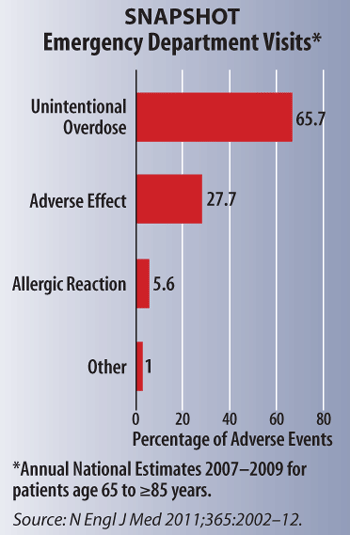A newly published study found that four commonly used medications cause the majority of emergency hospitalizations in elderly patients, while few hospitalizations result from medications typically designated as high-risk, according to a newly published study (N Engl J Med 2011;365:2002–12). Adverse drug reactions are important preventable causes of hospitalization in older adults, but only limited data had been available prior to this review.
The four medications in question include: warfarin, which accounted for 33% of emergency hospitalizations; insulin, which was involved in 14% of cases; antiplatelet drugs such as aspirin and clopidogrel, which resulted in 13% of cases; and oral hypoglycemic agents, which were involved in 11% of cases. Medications classified as high-risk accounted for only 1.25% of hospitalizations in this group.

Researchers pulled data from the National Electronic Injury Surveillance System–Cooperative Adverse Drug Event Surveillance project to calculate the frequency and rates of hospitalization after emergency department visits for adverse drug events in older adults. They analyzed adverse drugs events for 99,628 emergency hospitalizations that occurred from 2007–2009 in adults 65 years of age or older. Nearly half of all cases involved patients older than age 80.
Decreasing preventable hospitalizations by 20% by the end of 2013 is a goal of the $1 billion federal initiative, Partnership for Patients. As Americans live longer, more elderly patients will be taking these medications and will be at risk for these preventable adverse drug events, adding more costs to the healthcare system.
The authors call for greater focus on drug monitoring as a means to improve medication safety for older adults.
The full report is available online.